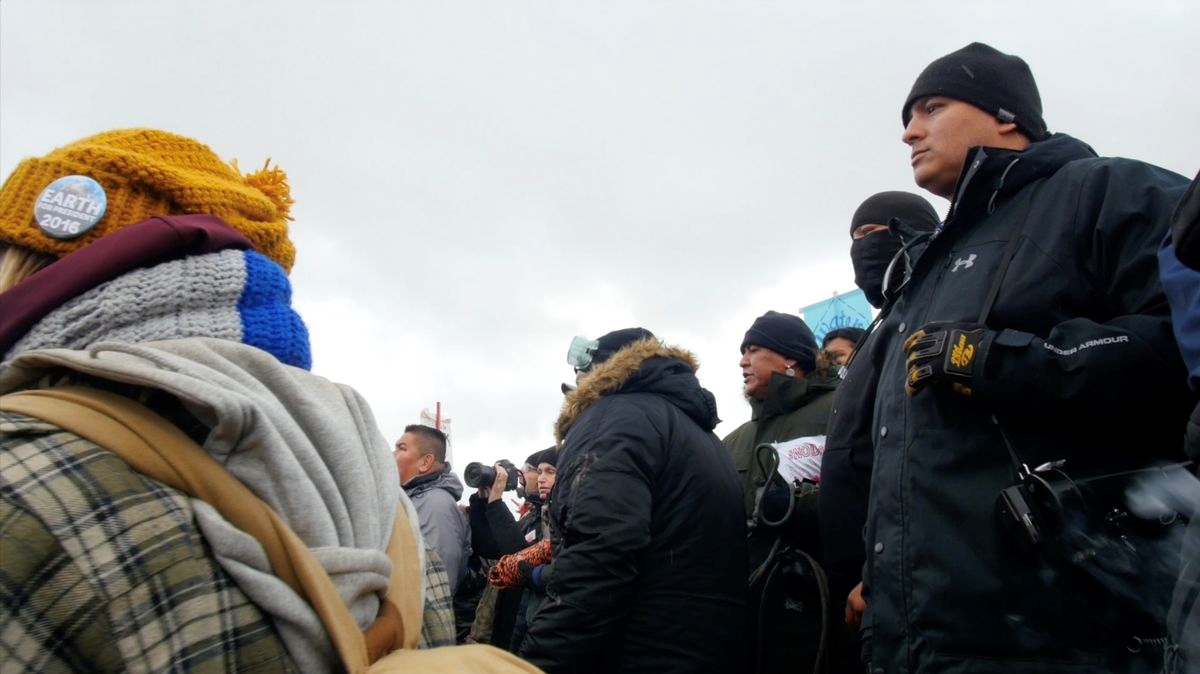
Essential Doc Reads is our curated selection of recent features and important news items about the documentary form and its processes, from around the internet, as well as from the Documentary magazine archive. We hope you enjoy!
The New York Times’ Holland Cotter reviews two concurrent shows featuring the work of Indigenous American filmmaker Sky Hopinka.
The video suggests that Mr. Hopinka finds himself, despite his ethnicity, having doubts about his role here. Supporter? Recorder? Critic? His panoramic shots of sprawling camps and wide-open landscapes catch the epic tenor of the occasion, as does the sustained shot of marching protesters that closes the piece.
Writing for the Sundance Institute Blog, Adam Piron talks to Native Hawaiian writer/director Ciara Lacy about her origins and process as an artist, and how she engages her community in her work.
There are many ways we can access telling a story: You can access it through community connection, you can access it through what we as Hawaiians call koko or blood—what your cultural/ethnic/racial background might be — and then there are other ways we can connect with work. You can be from a community but also not have the right process or be the right person to steward a story — so I have to understand for myself what is that piece of me that will find restoration through the work, and hopefully if I can find restoration, somebody watching the work can find that for themselves as well. And oftentimes, I know I’ve done my job right if the subjects I work with take away a sense of restoration from the process as well.
Deborah Schaffer has been making social issue documentaries for 50 years, dating back to her years with Newsreel. Having just released her latest film, Queen of Hearts: Audrey Flack, she reflects in Talkhouse on the movements in the '60s and '70s that informed her filmmaking career.
The single most important lesson that came out of those earth-shaking years of the women’s movement in the early ’70s is that “the personal is political.” What goes on in the kitchen and the bedroom is just as important as what happens on the battlefield or in the halls of government. Those lessons have never left me, and have informed everything I have done since. So while critics and old-timers are arguing pedantically about the accuracy of The Trial of the Chicago 7, I have to say that it captures the spirit of the times, the revolutionary fervor that inspired us to challenge the institutions and hierarchy and injustices all around us. The struggle continues, as we are reminded daily.
The New York Times' Adam Nagourney talks to filmmaker Matt Tyrnauer about his new Showtime docuseries The Reagans and his position that the 40th President was a subtle forerunner to the 45th President.
“The reason I wanted to make this was to show how Reagan in many ways paved the way for Trump — and the Republican Party that has now fallen into Trump’s hands,” he said in a video interview from his Coldwater Canyon home in Beverly Hills a week before Trump’s defeat was called. “I really thought it was very important to show that the Republican Party, certainly after the 1950s and since the era of this country’s civil rights movement and reckoning, has been on the wrong side of history. And Reagan was right at the center of that.”
From the Archive, June 2017 Online: “The Role of a Lifetime: Creating 'The Reagan Show'"
When we talk about Reagan as a "television president," it's a way of arguing that television is kind of the best lens to look at Reagan through. It's not a biopic. It's not a comprehensive overview of his presidency or the man. The film is really about the way he used media and media used him. And then, there's the fact that Reagan's skill set as an actor means he is uniquely suited to be in front of the camera; he has spent the majority of his adult life orienting himself for moving image. The way we approached this project was with the seed of the idea that we're interested in the performance and acting as a way of looking at the Reagan presidency. But that was really all we came to it with before we just started going through all the footage.
In the News
IDA Announces Honorary Awards
Grierson Trust Announces Awards Winners
Gotham Award Nominations Announced
DOC NYC Announces Short Lists for Features and Shorts
Hot Docs Awards $300K in Grants to 18 Films
Finalists Unveiled for Rose D’or Awards
Jon-Sesrie Goff Is Stepping Down as Executive Director of The Flaherty
Connor Schell to Exit ESPN to Form Production Company
BBC Investigating Explosive 1995 Princess Diana Interview as Scandal Blows Up
OWN Acquires Oge Egbuonu’s (Invisible) Portraits
IFC Films Acquires Robert Weide and Don Argott’s Kurt Vonnegut Documentary
Academy Museum of Motion Pictures Hits Pre-Opening Fundraising Goal
Applications for Andrew Berends Film Fellowship Now Open